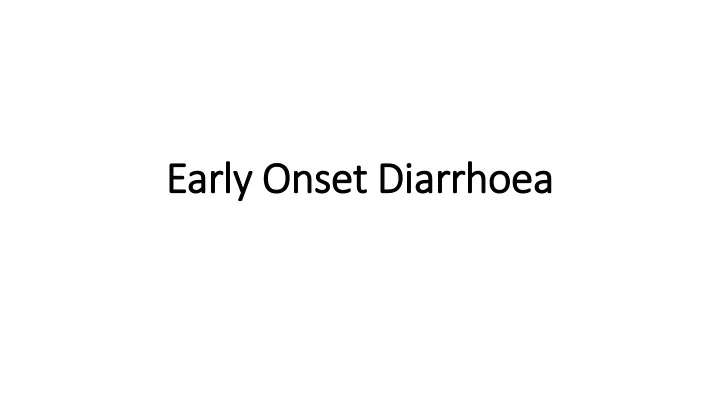

Early Onset Diarrhoea
Patient 1 • 7 month old male • Poor growth, wasted, moderate signs of dehydration • No other significant findings • Occasional loose stool (fat malabsorption?)
Patient 1 Special investigations • Electrolytes • Na 124 mmol/l • Cl 74 mmol/l • K 2,8 mmol/l • Acid Base • pH 7,52 • HCO3 36mmol/l
Antenatal History ry Antenatal Sonar • Polyhydramnios • Dilated intestinal loops
Clinical course in hospital • Denies any diarrhoea • Ward staff: No diarrhoea
Stool electrolytes After digital examination of rectum • Na 23 mmol/l • K 30 mmol/l • Cl 161 mmol/l
Congenital Chloride Diarrhoea 250 reported cases Wedenoja 2009
Wedenoja 2009
Patient 2 • 6 week old • Secretory diarrhoea, vomiting, severe malnutrition • Dysmorphic features • Facial features (triangular face, low set ears, penile hypospadia, bilateral camptodactyly) • Hair abnormal • Pigmented skin lesions
Patient 2 • Intolerant to any oral feeds • TPN started • Recurrent episodes of infection • Small bowel biopsy: moderate villous atrophy • 3,5 months in hospital • Died due to infection
Patient 2 • Metabolic screen: normal • Normal karyotype
Patient 2 (s (sib) • Sibling admitted to PICU at 3 months • Severe pneumonia (CMV) • Died on ventilator • Consanguineous family (first cousins, once removed)
Exome Sequencing Novel homozygous missense mutation in exon 42 of TTC37 Trichohepatoenteric syndrome Mutations in TTC37 (THES1) or SKIV2L (THES2) Trafficking or expression of apical proteins mRNA degradation
Tri richohepatoenteric syndrome • Severe diarrhoea in infancy • Hair abnormalities • Dysmorphic facial features • Immunodeficiency • Early onset IBD
Patient 3 • 20 month old boy • Recurrent infections: • Streptococcal infections • Septic arthritis • CMV • Pneumonia • Additional problems • Vasculitic rash • Laboratory • Thrombocytopaenia • High IgE
Patient 3 • Intestinal complaints • Reaction to cow's milk (improved with extensively hydrolysed formula) • Intermittent diarrhoea • PR bleeding
Patient 3 Small Bowel Histology • Duodenum: villous blunting, inflammatory infiltrate (mild, neutrophils and plasma cells) • Stomach: Chronic gastritis (>50 eosinophils/hpf) • Oesophagus: 2-3 eosinophils/hpf Improved on hydrolysed formula Colon (on MTX & Prednisone) • Crypt distortion • Mild cryptitis
Patient 3 Exome analysis • Wiskott Aldrich syndrome
Classification of f Congenital Diarrhoea Defects in: • Digestion, Absorption, transport • Enterocyte differentiation or polarisation • Enteroendocrine cells • Primary Immune Deficiency C. Posovszky. 2016
When to Suspect a Congenital Diarrhoea • Polyhydramnios • Dilated intestinal loops in utero • Family history • Consanguinity • Dysmorphic features • Early onset diarrhoea • No response to standard treatment • Associated complications/findings • Rash • Increased eosinophils • Increased IgE • Recurrent infections • Endocrine manifestations • Histology • Often difficult to interpret or non-specific
+ Immnune deficiency: 1. HIV 2. PID Ruemelle 2007
GENIUS Cohort Fabienne Charbit-Henrion Nadine Cerf-Bensussan Frank Ruemmele
GENIUS Group’s Experience 2009-2013 2013-2014 2015 PHENOTYPE BASED GENOTYPE BASED GENOTYPE BASED FUNCTIONAL TESTS EXOME SEQUENCING TARGETED PANEL SEQUENCING 106 patients 154 patients 207 patients Diagnostic: 29% Diagnostic: 28% Diagnostic: 36%
Conclusions • Genetic diseases causing early onset severe diarrhoea more common than thought • Next generation sequencing (Exome analysis/target panel) makes definitive diagnosis possible • Make friends with your geneticist & molecular biologist
Results: new dia iagnoses (2) IPEX-li like Co Common Chr Chronic ic Cong Co ngenit ital Di Diarrhea Mal Malabsorptio ion Co Colitis is is Infl flammasome Syn yndromes var aria iable le ID Gr Gran anulo lomatos osis MYO5B = = 2 LCT FOXP3 3 = = 4 ICOS CD40 CYBA MEFV STX3 SI SI = = 1 IL2RA IL10 CD40LG CYBB NLR LRC4 = = 1 NEU EUROG3 = 1 MGAM STAT1 = 1 IL1 L10RA = 1 TNFRSF13C/BAFFR NCF CF1 = 2 MVK EP EPCAM = = 1 SGLT1 STAT3 IL10RB TNFSF13B/BAFF NCF2 PLCG2 SPINT2 GLUT5 STAT5B XIAP = = 4 TNFSF13/APRIL NCF4 TTC37 37 = = 1 GLUT2 CTLA4 = = 2 IL21 TNFRSF13B/TACI SLC37A4 SKI SKIV2L = 3 SLC7A7 MALT1 IKBKG CD19 ITGB2 SLC26A3 SLC10A2 LRB LRBA = = 3 ADAM17 GUCY2C SLC39A4 PRSS7 ITCH NOD2 DGAT1 PRSS1 DOCK8 IL21R PCSK1 PNLIP WAS TTC7A = 1 MTTP DOCK2 APOB SAR1B SLC5A1
Patient 3 Male infant Recurrent presentations to ID service with pneumonia Initially thought to have PTB Developed intermittent diarrhoea Occasional blood in the stool
Patient 3 Stool cultures : no pathogens OGD : Normal Histology Sigmoidoscopy : Normal Histology
Patient 3 Additional Findings
Patient 3 Suspected PID Extensive discussion with immunologists Exome analysis: Awaiting BMT
Next xt Generation Sequencing Small fragments RNA baits of patient’s complementary to genomic DNA selected genes (Agilent) CAPTURE by HYBRIDIZATION SELECTION of TARGETED GENES HIGH THROUPUT SEQUENCING
Results: new dia iagnoses (1 (1) • 173 patients: • 100 boys (58%) • Median age of onset : 1 year • Median duration of disease: 7.5 years Age of Onset (years) 80 70 60 50 40 30 20 10 0 1.0 2.0 3.0 4.0 5.0 6.0 7.0 8.0 9.0 10.011.012.013.014.015.016.0
Recommend
More recommend